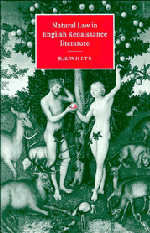Book contents
- Frontmatter
- Contents
- Preface
- Acknowledgments
- 1 Natural Law in history and Renaissance literature
- 2 The heritage of classical Natural Law
- 3 The reception of Natural Law in Renaissance England
- 4 Law and literature in sixteenth-century England
- 5 More's Utopia
- 6 ‘Love is the fulfilling of the law’: Arcadia and Love's Labour's Lost
- 7 ‘Hot temper leaps o'er a cold decree’: The Merchant of Venice and Measure for Measure
- 8 Shakespeare's The History of King Lear
- 9 Milton and Natural Law
- Epilogue: Hobbes and the Demise of classical Natural Law
- Appendix: Aquinas on the right to own private property
- Notes
- Select bibliography
- Index
8 - Shakespeare's The History of King Lear
Published online by Cambridge University Press: 17 September 2009
- Frontmatter
- Contents
- Preface
- Acknowledgments
- 1 Natural Law in history and Renaissance literature
- 2 The heritage of classical Natural Law
- 3 The reception of Natural Law in Renaissance England
- 4 Law and literature in sixteenth-century England
- 5 More's Utopia
- 6 ‘Love is the fulfilling of the law’: Arcadia and Love's Labour's Lost
- 7 ‘Hot temper leaps o'er a cold decree’: The Merchant of Venice and Measure for Measure
- 8 Shakespeare's The History of King Lear
- 9 Milton and Natural Law
- Epilogue: Hobbes and the Demise of classical Natural Law
- Appendix: Aquinas on the right to own private property
- Notes
- Select bibliography
- Index
Summary
In the plays by Shakespeare which we have looked at, a running debate is sustained between the rival claims of Natural Law and positive law in effecting ‘poetic justice’. So insistent is this debate that it is virtually a Shakespearian signature, and in King Lear we find no exception. In this play, moreover, Shakespeare sets in opposition particularly naked forms of the two legal systems, searches more profoundly the nature of their differences, and reveals in the ending an unsettling ambivalence which is a source of tragedy for the protagonists. The play is one of struggle and dialectic, dramatising, amongst other polarities, an archetypal clash between Natural Law and positive law, trust and mistrust in human beings, Aquinas’ idealism about people and the scepticism of Calvin and Hobbes. That the struggle is inconclusive, as it is in Love's Labour's Lost and Measure for Measure does not diminish the play's power, and gives evidence of Shakespeare's preference for incomplete closure, leaving the audience scope for exercising judgment.
In one sense, as many critics have observed, King Lear gives us a very simple view of good and evil. In the terms of Natural Law, good is humanitarian, communitarian, and is driven by compassion, reason, and conscience.
- Type
- Chapter
- Information
- Natural Law in English Renaissance Literature , pp. 185 - 215Publisher: Cambridge University PressPrint publication year: 1996



